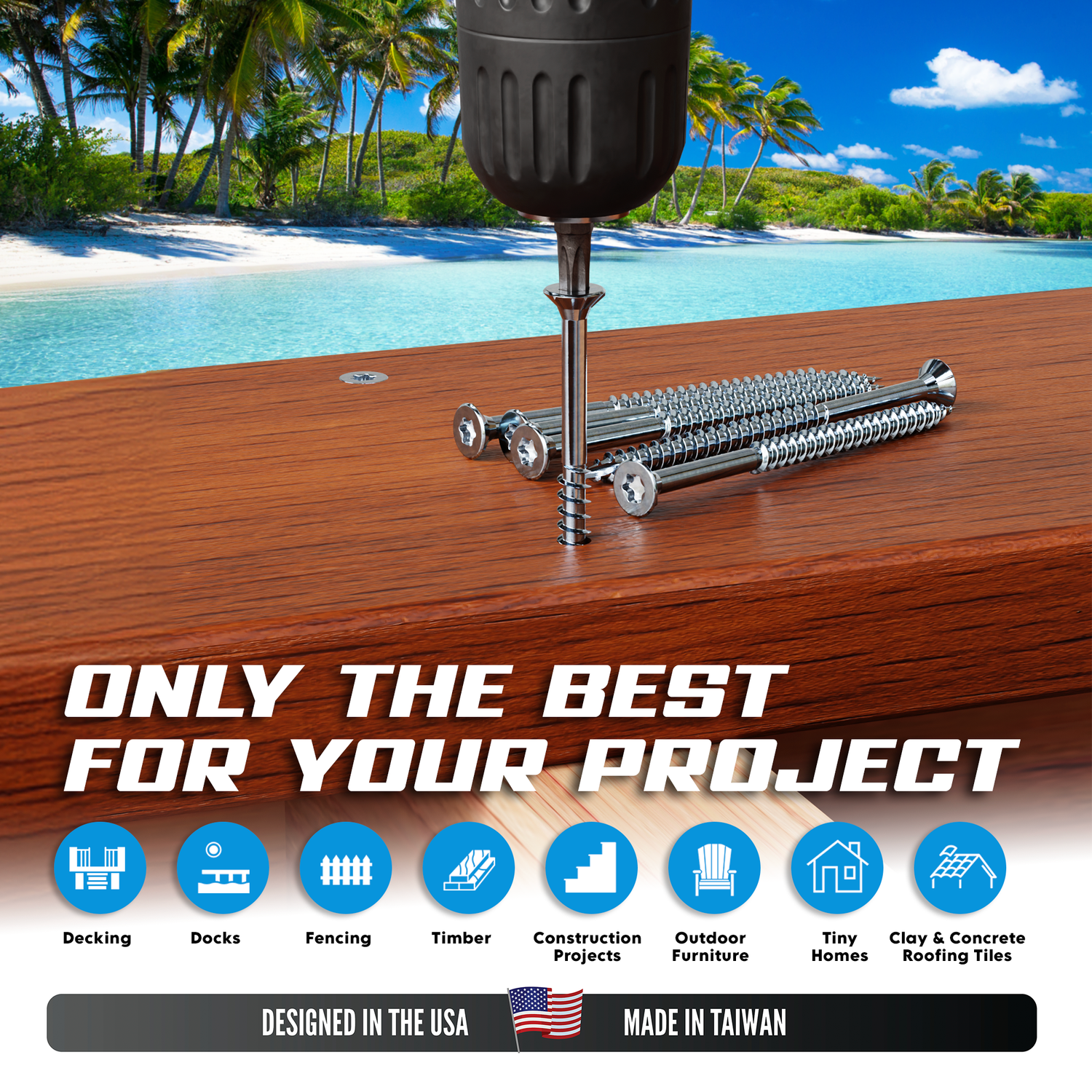
Which Screw Size Should I use to Build my Deck?
Share
We have all been there before: “Which screw size do I need?” we ask because deep down we know that bigger isn’t always better – at least that’s what we tell ourselves...
So, using the right size deck screws is important both for ensuring the structural integrity of your outdoor space as well as saving money by not buying the wrong thing and overspending on screws that are unnecessarily large for the project. With so many options available, it can be overwhelming to determine the best screw size for your deck boards.
We have explored the factors that influence the choice of deck screw size and are here to provide you with a comprehensive guide to help you make an informed decision on your deck screw purchase.

Deck Screw Gauges and Lengths Explained
Deck screws are typically measured using two primary dimensions: the gauge and the length. The gauge refers to the diameter of the screw, while the length indicates the overall length of the screw. The gauge of the screw is signified with a number (eg, #8, #10, etc ), with higher numbers indicating larger screw diameters, and the length obviously speaks for itself.
The head size is usually commensurate to the gauge, although there are exceptions.
(NOTE: there are some articles online that say the higher the gauge the smaller the screw, which is not the truth. This is a classic example of ChatGPT nonsense!)
Here are some common gauges with the inch and mm equivalent. Note that a gauge has an upper and lower limit, so view it as a range rather than a fixed number:
| #8 | 0.164" | 4.17mm |
| #10 | 0.190" | 4.83mm |
| #12 | 0.246" | 5.49mm |
| #14 | 0.250" | 6.35mm |
Factors to Consider When Choosing a Deck Screw Size
When selecting a deck screw size, consider the following factors:
Decking Material:
- Softwood decking (cedar, pine): #8 or #9 gauge screw.
- Hardwood decking (redwood, teak): #9 to #10 gauge screw.
Deck Board Thickness:
- 1-inch thick boards: 2 ½" screw
- 2-inch thick boards: 3" screw
Important: Always refer to the manufacturer's recommendations for the specific decking material you are using. The general Rule of Thumb for calculating screw length is to multiply the thickness of the material being fastened by a factor of three.
Joist Structure and Local Building Code
We also need to consider the size and spacing of the joists in your deck frame. Check what your local building code specifies, but generally 12” to 16” center to center is accepted. The size would depend on the construction method and space available. We cannot state clearly enough how important it is to build according to local code. A sticky inspector WILL make you lift your decking and increase joist sizes if they are not to spec. It happens, believe us! Joists, beams and ledger boards are best connected with wood construction connectors.

Environmental Factors and Deck Screw Selection
The climate and environmental conditions in your area can impact the performance of your deck screws. You need to know how to choose between using 304 and 316 SS deck screws.
In regions with high humidity or extreme temperature fluctuations, for example in coastal or marine environments, 316 grade stainless steel deck screws are non-negotiable to prevent rust and corrosion. In dryer areas, coated or mechanically galvanized fasters are a more economical option.
By taking these factors into account, you can select the right deck screws for your specific project and ensure a long-lasting deck. We often find that the stainless steel screws outlast the deck itself, so even if you’re not in a coastal environment the 304 grade stainless steel screws are seriously worth looking into. Most decking screws are available in a collated option, saving you time and effort.
Select the Right Deck Screws for a Long-Lasting Deck
Choosing the right deck screw size is a critical aspect to ensure your deck will last for many years. By considering the type of decking material, thickness of deck boards, joist structure, climate and environmental factors, you can select the perfect screw size for your project. Also, you need to remember to always consult with a professional, experienced builder or contact us for expert advice tailored to your specific deck project. (If you are a professional or experienced builder, you can sign up as a contractor for better pricing.)
Work safe, and all the best with your next project!


